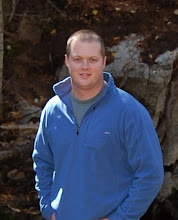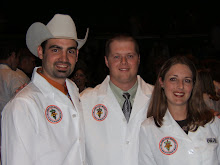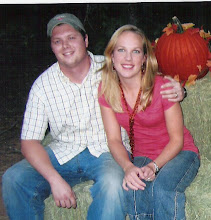I pick the phone up from the receiver and call the number on the pager as I walk into the kitchen where Emily is already up and getting ready to go to school.
“Did you get a call?” She asks as she pours herself a cup of coffee from the pot.
I nod distractedly as the rancher answers the phone in my ear. “Mr. Smith? This is Dr. Carpenter from the T-Town Veterinary Clinic,” I say in a professional tone that I have been practicing. “I received a page that said you are having trouble with a heifer calving.”
A pause from the other end, followed by, “Uhhh. You must be new.”
I grit my teeth. This is not the first time I’ve heard this comment. “Yes sir. How long has your heifer been in labor?”
“I don’t know. I found her out by the pond this morning, but she may have been at it a while. It looks like the calf is already dead and part of it is hanging out of her. Do you think you can come out and pull it?” is Mr. Smith’s reply.
“Sure. Can you give me directions to your place?” I quickly jot down the directions on a notepad and give him an estimation of how long it will take me to get there. Hanging up the phone, I quickly get dressed and brush my teeth.
As I am pulling on my work boots Emily hands me a cup of coffee, asking, “Do you have time for some breakfast?”
“No. I’m not really hungry anyway. I’m going to run up to the clinic and grab a few things and head on this call. A calf-pulling. I love you, and I’ll see you after work,” I call over my shoulder as I’m heading out the door.
“Be careful,” she calls as I’m tromping down the front steps, my coveralls thrown over my shoulder, coffee in one hand and the keys to my truck in the other. As I am pulling out of the gravel driveway in front of our house, I wonder why on earth I ever wanted to get into this crazy profession.
________________
The first time I can remember wanting to be a veterinarian was when I was nine years old. My dad and I had taken a cow to the Oklahoma State University Veterinary Hospital to have a corn removed from between its toes. As we were waiting for our case to be seen, one of the clinicians at the hospital took us on a tour of the large animal clinic. It was like walking into a scene that was some surrealist combination of an E.R. and a zoo. In one area a veterinarian was passing an endoscope down the throat of a horse to examine its esophagus, showing us on the monitor the different parts of the anatomy. Through a glass window, you could see a team of surgeons clustered around a blue-draped figure that was recognizable as a pig only by the tip of its snout poking out from underneath the surgery drape. In a stall in the barn stood an elk and across from it was a camel. I remember thinking that to work with so many different animals and to do so many interesting things had to be the greatest job in the world. I had originally wanted to make a career out of capturing wild animals for zoos, like John Wayne in Hatari!, but I had learned that this career path wasn’t much of an option at the time, as most zoo animals were captive bred. So this seemed like an acceptable alternative. My enthusiasm for the industry continued as I grew older and became more involved with helping my dad doctor our livestock and watching Dr. E and Dr. L, the local veterinarians in my hometown, work on our animals when they were sick.
I grew up on a small family farm consisting of 80 acres of pasture land in central Oklahoma near a small town of about 7000 people. My parents were teachers, my mom teaching home economics and my dad taught history. Later, Dad became the athletic director and then high school principal. Financially we were middle class, which was saying something in an area where the average income per household is still less than $30,000 and 20% of the population lives below the poverty level. Although we were far from rich, we could afford to run a small herd of Beefmaster cattle on our land which was part of the original acreage that was homesteaded by my great, great grandfather in the late 1800’s.
I am an only child, which, I am quick to point out to people, means something entirely different when one comes from a rural, agricultural background. Not having any siblings meant that I was the only person my dad could call on for help building fence, digging ditches, tending the stock, and the myriad of other chores and responsibilities that came with raising livestock. I was never spoiled. My parents spent too much of their day dealing with discipline problems from other people’s children to allow me to get away with much at home. I did have several cousins that were close to my age that lived within walking distance of my house, but I spent a lot of time alone as a child which led to the development of a very healthy imagination. I spent countless hours as a lone Comanche warrior, stalking imaginary buffalo across our pastures, as a knight-errant, ridding our woods of bandits, and as an Amazon explorer, tracking the elusive Oklahoma anaconda. Thankfully there weren’t a lot of neighbors who lived close enough to witness me as a youngster, traipsing around with wooden swords made out of axe handles, because I would have looked like a total weirdo. And I did pretty much cut that out by high school. For the most part.
The other thing that came with having a lot of time to myself as a kid was that I developed a love for reading. From the time I learned to read I have had a book in my hand. My favorite topics early on were dinosaurs as well as ancient and medieval history, which I read about extensively in the family set of encyclopedias. I later became interested in the fantasy series of Lloyd Alexander and Jane Yolen, and the westerns of Louis L’Amour and Don Coldsmith. Even in college and veterinary school, where the required reading was overwhelming, I usually had a novel of some kind tucked away for when my studies were finished. I believe this early love for reading contributed greatly to my education and laid the foundation for a diligent and successful academic career throughout my life.
Academics were always my strong point in school. I made good grades all the way through and graduated near the top of my class, even in vet school. It was something that came relatively easy for me early on, but I didn’t slack off. When I was assigned homework, I finished it; when a test was scheduled, I studied for it. Most people of average intelligence do well in high school if they will do these things and not get overly distracted by sports, hormones, or delinquency. Doing well academically was something that I expected of myself, it wasn’t something that I took great pride in or bragged about, it was just what I did. In this country, being a gifted student does not make one popular or gain the respect of one’s peers. Athletic achievement, originally intended as an extracurricular activity to provide recreation and exercise, has long since become the primary focus if not necessarily the purpose for attendance in high school. Think I’m wrong? How many parents do you know who can tell you the score to the state championship game that their child starred in but don’t have a clue what their ACT score was? Which is fine until graduation comes and the majority of these high school hondos never play at the competive level again in their lives. Until they have to find something else in which to take pride in and in which to define themselves as a person. Then a lot of these kids struggle because that jump shot which made them a god in high school but just wasn’t quite good enough to make it at the college level, much less professionally, just isn’t that marketable in a job interview.
Luckily, I didn’t have that problem. I was never a very good high school athlete. Oh, I played. Participation is pretty much compulsory starting in grade school; after all, one’s social status is firmly based on athletic ability, particularly among boys. I was on the basketball team from the 5th grade until I finally threw in the towel my Junior year. In middle school I was better. I hit an early growth spurt (same 5’10 in the eighth grade that I am today) and was the backup center. Unfortunately, by the time we were in high school, the point guard was taller than I, and I wasn’t fast enough or coordinated enough to be very good at all. So I turned to other activities, such as FFA, student council, band, and golf. This broad spectrum involvement meant that I was a part of almost every group at our small school where cliques were inevitable. So although I was never the most popular kid in any of the cliques, I was an accepted member of them all.
The organization that gave me the most confidence in myself at that time in my life was, ironically enough, the Junior Beefmaster Breeders Association, an organization where kids could exhibit the cattle that they had raised at such things as the county and state fairs, as well as larger, national shows. Through this organization, I found success at an activity other than academics and was able to travel and meet a lot of other kids my age from across the country and even took a leadership role on their national board of directors. About this time I also discovered girls. To be more accurate, girls discovered me (I had long since knew of their existence and admired them from afar). For some reason at this time my appreciative glances began to be returned and I started dating. One relationship became pretty serious and my parents would say that I definitely became “distracted” by the above-mentioned hormones. I would say that I fell in love for the first time. Unfortunately, sometimes the flames that burn brightest do not last. I’m not going to go into great length about this subject here as it would take too long to detail the events of that relationship. Let me just say that I wish her well, wherever she is today.
So by the time I was a senior in high school I was confident enough in myself to run for student council president. My opponent was the quarterback of the football team, the starring player on the basketball team, from one of the wealthiest families in town, and definitely the most popular kid in our school. Due to this he had been voted our class’ president all through high school. He was the stereotypical high school god. All the girls wanted to date him, all the guys wanted to be him. He could be incredibly arrogant and wasn't always nice to the people around him. I definitely considered myself the underdog. But a funny thing happened. I won. Although I wasn’t a campus god, I was everyone’s friend. The jocks liked me because I had spent years sweating beside them in the gym, the FFA kids liked me because I wore the same blue corduroy jacket at the county fair as they did, and the kids in the band liked me because I played the trumpet and marched beside them at football games. And even though everyone wanted to be like the other guy, quite a lot of people also thought he was arrogant and remembered when he had made fun of them over the years. (Incidentally, my arrogant opponent later grew into a humble, considerate adult and has led an amazing life helping people around the world. So people really can change.)







No comments:
Post a Comment